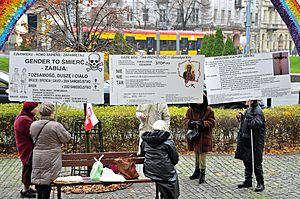Gender studies facts for kids
Gender studies is an academic field that looks at gender identity and how gender is shown in society. It's like queer studies and men's studies. It grew out of women's studies, which focused on women, feminism, and politics. Gender studies became popular in universities, especially after 1990.
Many subjects help make up gender studies. These include literature, linguistics, human geography, history, political science, archaeology, economics, sociology, psychology, anthropology, movies, musicology, media studies, and law. It also explores how things like race, ethnicity, social class, and disability connect with gender. This idea is called intersectionality.
In gender studies, "gender" often means the social and cultural ideas of what it means to be masculine or feminine. It's not just about being born male or female. However, not everyone agrees on this. Thinkers like Simone de Beauvoir and Judith Butler have different ideas about gender.
Gender is important in many areas. These include literary theory, drama, film theory, art history, anthropology, and sociology. Each field studies gender in its own way. Gender studies itself combines ideas from many different subjects.
Many fields see gender as something we "do" or "perform." Feminist theory, especially from thinkers like Julia Kristeva and Bracha L. Ettinger, has greatly influenced gender studies. They use ideas from Sigmund Freud and Jacques Lacan.
Contents
How Gender Studies Grew
Gender studies has been shaped by many important thinkers. They helped us understand gender in new ways.
Ideas from Psychology
Some thinkers used psychoanalysis to understand gender. Julia Kristeva explored how societies might push away feminine ideas. Bracha L. Ettinger looked at how we connect with our mothers early in life. She suggested this connection shapes how we see ourselves and others.
Feminist Views on Psychology
Many feminist thinkers have used and changed psychoanalytic ideas. They include Juliet Mitchell, Nancy Chodorow, and Judith Butler. They believe that understanding psychology is key for feminism. They also say that these ideas need to be looked at critically to remove any old sexist views.
Some critics, like Elizabeth Grosz, say that Jacques Lacan kept sexist ideas in his work. But others, like Judith Butler, have used Lacan's ideas in new ways for gender theory.
Ideas from Literature
Feminist thinkers also looked at literature and art. Virginia Woolf and Adrienne Rich encouraged women to rewrite old stories and histories. They wanted women to tell their own versions. Griselda Pollock and other feminists explored myths and poetry from a gender perspective.
Modern Influences
New ideas called post-modernism changed gender studies. They moved away from the idea that gender identity is fixed. Instead, they suggested that gender can be fluid or have many parts. This led to the rise of queer theory.
Post-modern ideas also led to the study of masculinity. Thinkers like R. W. Connell and Michael Kimmel explored what it means to be a man in society.
These new ideas caused some disagreements. For example, some feminists and queer theorists had different views. Feminists worried that focusing too much on fluid identities might ignore how gender creates real-world unfairness. They argued that even if gender is a social idea, it still leads to oppression.
Things People Say About Gender Studies
Gender studies has faced some criticism. People have different opinions about it.
Historian Bryan Palmer thinks that gender studies sometimes focuses too much on ideas and not enough on real-life experiences. He believes it should look more at how people live and how power structures work. Psychologist Debra W. Soh has said that gender studies is not scientific and can cause problems for children.
Feminist philosopher Rosi Braidotti has worried that gender studies might take funding away from feminist research. She suggested that some positions meant for gender studies were given to men. She also thought that some publishers might promote gender studies in a way that makes feminism less radical.
The Catholic Church has criticized gender studies. They see it as going against human biology. Pope Francis has called teaching about gender identity in schools "ideological colonization." This means he thinks it's an unwanted influence that threatens traditional families. This idea became popular in France when Catholic groups protested against a law allowing gay marriage.
Some places have even banned teaching certain parts of gender theory. For example, in New South Wales, Australia, some teaching materials were removed from public schools.
What Governments Think About Gender Studies
Governments in different countries have different views on gender studies.
In Central and Eastern Europe, there are growing movements against gender studies. This is especially true in Hungary, Poland, and Russia.
Russia
In Russia, gender studies is generally allowed. However, the government has removed some laws related to gender, like those dealing with domestic violence. Russia has also pushed for "traditional values" at the UN Human Rights Council.
Hungary
Hungary banned gender studies programs in October 2018. Prime Minister Viktor Orbán's office stated that "people are born either male or female." They said they don't accept talking about socially created genders instead of biological sex. This ban has been criticized by many European universities.
China
The Central People's Government in China supports studies on gender and social development. They also support practices that lead to gender equality. This follows Mao Zedong's idea that "Women hold up half the sky," which promoted equality between men and women.
Romania
In June 2020, the Romanian Senate approved a law to ban theories that say gender is separate from biological sex. However, in December 2020, the Constitutional Court of Romania overturned this ban.
See also
 In Spanish: Estudios de género para niños
In Spanish: Estudios de género para niños
 | Georgia Louise Harris Brown |
 | Julian Abele |
 | Norma Merrick Sklarek |
 | William Sidney Pittman |


